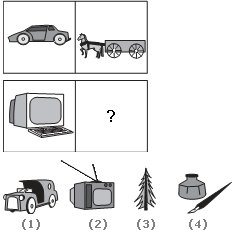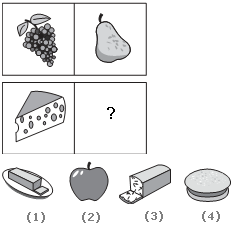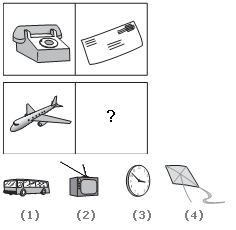Discussion
Home ‣ Logical Reasoning ‣ Statement and Assumption See What Others Are Saying!
- Question
Statement: An advertisement of Bank X - "Want to open a bank account! Just dial our 'home service' and we will come at your doorsteps."
Assumptions:
- No other bank makes available service at the doorstep of the customer.
- People may choose Bank X for their financial transactions.
- Nowadays banking has become very competitive.
Options- A. Only I and II are implicit
- B. Only II and III are implicit
- C. Only I and III are implicit
- D. All are implicit
- E. None of these
- Correct Answer
- All are implicit
ExplanationThe advertisement seeks to attract people to open their account in Bank X by promising them service at their doorstep. Since home service' has been used as a tool for earning clientage, so I is implicit. Also, the advertisement seeks to impress upon the people's minds how simple it has become to open an account. This may attract more account holders to Bank X. So, II is implicit. Further, providing banking services at home means that banking has become so competitive that door-to-door service is being provided by the Bank to attract people. Hence, III is also implicit. - 1. PSYCHOLOGIST : NEUROSIS
Options- A. ophthalmologist : cataract
- B. dermatologist : fracture
- C. infant : pediatrician
- D. rash : orthopedist
- E. oncologist : measles Discuss
- 2. Optimist is to cheerful as pessimist is to
Options- A. gloomy
- B. mean
- C. petty
- D. helpful Discuss
- 3. Statements: Death keeps no calendar.
Conclusions:
- Man must die one day.
- Death can come at any time.
Options- A. Only conclusion I follows
- B. Only conclusion II follows
- C. Either I or II follows
- D. Neither I nor II follows
- E. Both I and II follow Discuss
- 4. Which word does NOT belong with the others?
Options- A. cornea
- B. retina
- C. pupil
- D. vision Discuss
- 5. Many business offices are located in buildings having two to eight floors. If a building has more than three floors, it has a lift.
Options- A. All floors may be reached by lifts.
- B. Only floors above the third floor have lifts.
- C. Seventh floors have lifts.
- D. Second floors do not have lifts. Discuss
- 6. Choose the picture that would go in the empty box so that the two bottom pictures are related in the same way as the top two:

Options- A. 1
- B. 2
- C. 3
- D. 4 Discuss
- 7. Choose the picture that would go in the empty box so that the two bottom pictures are related in the same way as the top two:

Options- A. 1
- B. 2
- C. 3
- D. 4 Discuss
- 8. Choose the picture that would go in the empty box so that the two bottom pictures are related in the same way as the top two:

Options- A. 1
- B. 2
- C. 3
- D. 4 Discuss
- 9. Statements: National Aluminium Company has moved India from a position of shortage to self-sufficiency in the metal.
Conclusions:
- Previously, India had to import aluminium.
- With this speed, it can soon become a foreign exchange earner.
Options- A. Only conclusion I follows
- B. Only conclusion II follows
- C. Either I or II follows
- D. Neither I nor II follows
- E. Both I and II follow Discuss
- 10. Statement: Footpaths of a busy road are crowded with vendors selling cheap items.
Courses of Action:
- The help of police should be sought to drive them away.
- Some space should be provided to them where they can earn their bread without blocking footpaths.
Options- A. Only I follows
- B. Only II follows
- C. Either I or II follows
- D. Neither I nor II follows
- E. Both I and II follow Discuss
More questions
Correct Answer: ophthalmologist : cataract
Explanation:
A psychologist treats a neurosis; an ophthalmologist treats a cataract.
Correct Answer: gloomy
Explanation:
An optimist is a person whose outlook is cheerful. A pessimist is a person whose outlook is gloomy. The answer is not (choice b) because a pessimist does not have to be mean. (Choices c) and d are incorrect because neither adjective describes the outlook of a pessimist.
Correct Answer: Both I and II follow
Explanation:
Both I and II directly follow from the statement.
Correct Answer: vision
Explanation:
The cornea, retina, and pupil are all parts of the eye.
Correct Answer: Seventh floors have lifts.
Correct Answer: 4
Explanation:
Car is to horse and buggy as computer is to pen and ink. This relationship shows the difference between modern times and times past.
Correct Answer: 1
Explanation:
Grapes are to a pear as cheese is to butter. This relationship shows the grouping or category to which something belongs. Grapes and pears are fruit; cheese and butter are both dairy products.
Correct Answer: 1
Explanation:
A telephone is to a stamped letter as an airplane is to a bus. A telephone and letter are both forms of communication. An airplane and bus are both forms of transportation.
Correct Answer: Both I and II follow
Explanation:
According to the statement, National Aluminium Company has moved India from a position of shortage in the past to self-sufficiency in the present. This means that previously, India had to import aluminium. So, I follows. Also, it can be deduced that if production increases at the same rate, India can export it in future. So, II also follows.
Correct Answer: Both I and II follow
Explanation:
Crowding on footpaths is a great inconvenience for walkers. So, stern action needs to be taken to remove the vendors. But at the same time these people ought to be provided alternative means of livelihood. So, both the courses follow.
Comments
There are no comments.More in Logical Reasoning:
Programming
Copyright ©CuriousTab. All rights reserved.
